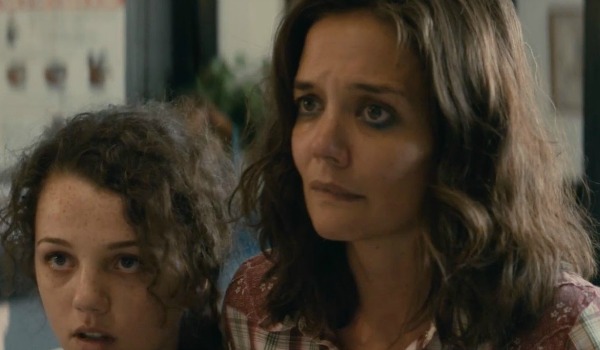Katie Holmes probably wasn't the first actress you'd expect to direct her own feature film. But the more you look at how her career has panned out, and the depressing lack of weighty roles for actresses in her age range, the more sense it makes for her to take control of her professional destiny.
If there's any justice All We Had will now be the springboard for a rejuvenation of her career not just as an actress but as a filmmaker, too. Katie Holmes' impressive directorial debut is peppered with fine performances and stretches what could easily be run-of-the-mill drudgery into a touching, albeit inconsistent, portrayal of modern working class America. Katie Holmes showcases a knack for eking out downtrodden drama and keeping it interesting while also allowing it to unfold in a desperately realistic fashion, although it never quite plunges into the all out despair it teases.
Katie Holmes stars as Rita Carmichael, the unemployed mother of 15-year-old Ruthie Carmichael (Stefania LaVie Owen). After deserting their home for their car the pair set out for Boston, and the opening 20 minutes of All We Had shows them scraping by just barely. After their car breaks down, and they spend their last dime, the duo try to run out on a cheque in a local diner. But Rita decides that fate wants them to stay in the town, and she gets a job as a waitress, while Ruthie starts school, but their past demons and the threat of bankruptcy means they're always on the precipice of failure.
During All We Had's opening stages you're waiting for it to settle. Not that watching Rita and Ruthie's burgeoning road-trip isn't engaging. A disheveled Katie Holmes and Stefania LaVie Owen are able to immediately generate a warmth and patter that is the basis for the rest of the film, especially because LaVie is basically Holmes' doppelganger, while Josh Boone (Fault In Our Stars)'s script and Holmes' direction throws more and more pressure on the duo.
During All We Had's opening stages you're waiting for it to settle. Not that watching Rita and Ruthie's burgeoning road-trip isn't engaging. A disheveled Katie Holmes and Stefania LaVie Owen are able to immediately generate a warmth and patter that is the basis for the rest of the film, especially because LaVie is basically Holmes' doppelganger, while Josh Boone (Fault In Our Stars)'s script and Holmes' direction throws more and more pressure on the duo.
But by the time Rita and Ruthie arrive at the diner in the town where they soon make their home you're about ready for All We Had to expand, which comes with the addition of a wider cast that includes the owner of the diner Marty (Richard Kind), waitress Peter Pam (Eve Lindley), recovering alcoholic Lee (Luke Wilson), and Rita's new beau Vic (Mark Consuelos).
While All We Had's stories are hardly original or revelatory there are one or two truly affecting scenes. Katie Holmes structures them well, too, as she moves the point of view from Rita to Ruthie and back again to keep things fresh, and she never burdens the film with melodrama or cliche, instead letting you just get a sense of how desperate their situation has become.
Your Daily Blend of Entertainment News
All We Had's opening scenes of depravity hang over the remainder of the film as the threat of financial implosion looms, as you hope that Rita and Ruthie don't fall back into homelessness. But once it takes up residency All We Had plateaus, and unfolds as more of a series of vignettes rather than a cognitive piece that builds. But a career best performance from Katie Holmes, and startling work from Stefania LaVie, means that _All We Had _is always probing for emotion, with its human moments giving it an earnestness that's a little naïve but uplifting.
All We Had eventually takes the easy route out, and folds things up in a rushed and underwhelming fashion. But there's more than enough to deem Katie Holmes's first outing as director a triumph, and she deserves further opportunities to develop her skills within the confines of a stronger story.


